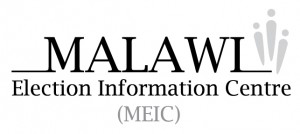Statement for Immediate Release
Malawi 2014 tripartite elections
Pre elections situation
May 19, 2014
The Malawi Electoral Support Network (MESN) under the banner of the Malawi Election Information Centre (MEIC) would like to highlight a number of pertinent issues that could potentially have both negative and positive impact on the upcoming Elections.
On the positive side, MESN would like to commend MEC for improving the flow of information and timely reporting and consultations with key stakeholders. We believe that the constant flow of information from MEC has helped reduce the level of bias on the part of the election management body.
Another notable development is the presidential debates. The debates have provided candidates the opportunity to dialogue with the voters and to turn the campaign into an issue-based one. As MESN we believe in issue based elections and we will support the sustainability of this initiative to ensure that Malawians vote for candidates based on issues and policies and not otherwise as has been the trend in the past.
We would also like to state that although the State broadcaster, the Malawi Broadcasting Corporation (MBC) continues to favor the party in power and the incumbent it is however, pleasing to note that of late there has been notable improvement. An April 2014 media monitoring study report by the IWPR/USAID/DFID Media Monitoring Project showed that the public broadcasters provided 70% coverage to the incumbent People’s Party presidential candidate, compared to less than 10% for all the other candidates. This is still worrisome, but we would like to state that MBC was devoting over 90 percent of its coverage to the party in power and 70 percent is an improvement. We hope MBC will continue to improve.
The private media have comparatively provided better coverage of all the key political players in these elections. However, they, too, have been rather limited in terms of the themes covered, the key issues raised, and in providing space for dialogue between the candidates and the voters. The electoral process received 32% coverage, followed by law and order at 9%, corruption and cashgate at 8% and the economy again at 8%. A general concern, however, is the general nature of the coverage itself which is Executive-focused with 37.9% coverage for presidential candidates compared to 11% for parliamentary candidates and 1.7% ward councilors. We hope the media will improve for the better and create an equal playing field for all contestants especially during the announcement of unofficial results.
We would also like to indicate that the inclusion of younger and new- candidates in the presidential and parliamentary contests assures the country of leadership renewal. New and future political leaders are emerging in the country and as MESN we would like to encourage political parties to continue with this approach and invest more in young and visionary individuals.
That said, we would like to highlight a number of challenges which we strongly feel have a direct bearing on the elections.
- The legal framework is still problematic, with incomplete harmonization of the laws. The unpopular Local Government Amendment Act of 2010 not reviewed.
- The late appointment of Commissioners resulted in delays in the release of the electoral calendar. The Commission was also totally new, except for one member from an early Commission, which may have affected institutional memory.
- The credibility of the voters roll is still questionable with the clean-up exercise not being thorough and complete.
- The list of candidates for constituencies and wards are not thoroughly cleaned up with anomalies like two candidates in one ward, and names of candidates missing in some constituencies.
- Inadequate funding for the elections and civic education may affect the quality of the electoral process and the civic education itself.
- Local government elections being sidelined in the entire electoral process.
- Fatalities have already been reported, coming days before the official opening of the campaign period. This raises concerns about possibility of post-election violence.
- Media coverage is too executive-focused, with less attention to the local government elections
- The playing is far from being level field. The distribution of handouts, use of public resources, and the involvement of chiefs in politics have created a political environment that has resulted in the un level playing field.
- Two to three years prior to the elections civil society organizations were battered and brutalized, this, coupled with poor funding for civic education, have undermined the capacity for these bodies to effectively contribute to the election processes in the country.
- Much as there has been some increase in the numbers of female contestants in these elections, the increases are rather minimal. In percentage, the number of female parliamentary candidates has in fact gone down compared to that of men.
It is therefore our collective view as MESN that these challenges have the potential of affecting the elections and needs to be noted. We hope all parties and electoral stakeholders will work together to ensure a free, fair and credible elections.
Signed
Steve Duwa
Chairperson, MEIC
